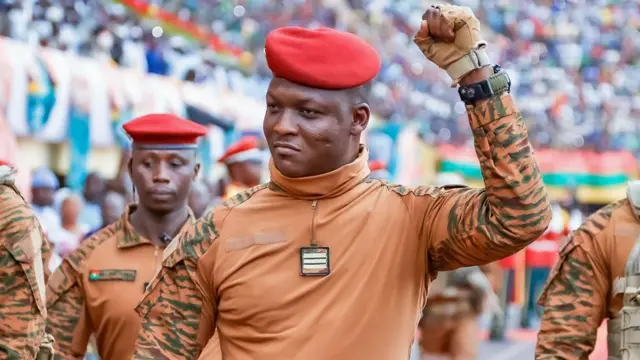Capt Ibrahim Traoré: A New Era for Burkina Faso
At just 37 years old, Captain Ibrahim Traoré, the military leader of Burkina Faso, has crafted an image as a pan-Africanist figure. He aims to liberate his nation from what he perceives as Western imperialism and neo-colonialism. His approach has found considerable support not only within Burkina Faso but also across Africa, positioning him alongside celebrated figures like Thomas Sankara, a former president often dubbed “Africa’s Che Guevara.”
Beverly Ochieng, a senior researcher at Control Risks, noted that Traoré’s influence has expanded far beyond Burkina Faso. “His rhetoric resonates during a time when many Africans are scrutinizing their ties with Western nations and the persistent poverty in a resource-rich continent,” Ochieng stated.
A Shift in Alliances
Since taking power in a coup in 2022, Traoré’s administration has pivoted away from France—historically Burkina Faso’s colonial power—and forged closer ties with Russia. This realignment has led to an arrangement involving Russian paramilitary forces and the adoption of leftist economic policies, such as creating state-owned mining companies. The regime mandates foreign businesses to provide a 15% equity share to the Burkinabé government and transfer operational expertise to local workers.
This policy shift has affected international companies, including Australia-based Sarama Resources, which initiated arbitration proceedings against the government after it revoked their exploration license. Additionally, the military government has nationalized two gold mines previously owned by U.K. interests and announced intentions to control more foreign-operated mines.
Resonating Beyond Borders
Traoré’s popularity continues to surge, partly fueled by social media. Many misleading posts have emerged to enhance his revolutionary image. AI-generated videos featuring music icons praising Traoré have surfaced, although they lack authenticity. His pivotal speech at the Russia-Africa summit in 2023, where he urged African leaders to stop acting as “puppets” of imperialists, garnered significant attention, boosted by Russian media outlets.
Despite his popularity, Traoré’s methods have attracted criticism. French President Emmanuel Macron dismissed him as part of an odd alliance of self-proclaimed pan-Africanists and neo-imperialists. Macron’s stance reflects broader Western apprehension regarding Traoré’s rise, particularly given the backdrop of increasing anti-Western sentiment in the region.
The Challenges Ahead
While Traoré’s regime has cultivated a strong following, it faces pressing challenges. His promise to quell a decade-long Islamist insurgency remains unfulfilled, and the government’s crackdown on dissent has drawn scrutiny, targeting opposition figures, media, and civil organizations to suppress criticism.
Rinaldo Depagne from the International Crisis Group believes Traoré’s popularity is rooted in his youth and media-savviness, especially among a nation with a median age of 17.7 years. “He creates a narrative that offers a hopeful vision for a society traumatized by conflict,” said Depagne, highlighting Traoré’s ability to resonate with the public by invoking past leaders like Sankara.
| Metric | 2023 | 2024 |
|---|---|---|
| Inflation Rate | 0.7% | 4.2% |
| Extreme Poverty Rate | 26.9% | 24.9% |
| Domestic Revenue Growth | N/A | Commendable Progress |
As military regimes reshape the political landscape of West Africa, Traoré stands as a central figure symbolizing the emerging sentiments among youths seeking change. His presidency embodies a complex interplay of charisma and challenge, as he attempts to rewrite the narrative of governance in Burkina Faso while confronting both internal and external pressures.


